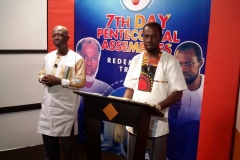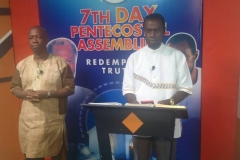Is There Hope after Death?
By : Elder Enoch Ofori Jnr
(Sunday, Sept. 11, 2011)
The uncanny ability of death to make life seem meaningless has long been recognized. St. Paul writing in the first-century AD quotes Greek philosopher Epicurus as teaching his followers, “Let us eat and drink, for tomorrow we die” (1 Cor. 15:32; see Acts 17:18; cp Isa. 22:13).
Outside worldly philosophies, the Bible itself is not without trite observations about the meaninglessness of life in the face of death. In the anguish of his soul amid his grave misfortune, Job lamented: “Naked I came from my mother’s womb, and naked shall I return” (Job 1:21). In Eccl. 3, King Solomon soliloquizes:
“I said in my heart with regard to the children of man that God is testing them that they may see that they themselves are but beasts.
“For what happens to the children of man and what happens to the beasts is the same; as one dies, so dies the other. They all have the same breath, and man has no advantage over the beasts, for all is vanity.
“All go to one place. All are from the dust, and to dust all return” (vv. 18-20 ESV).
So, is death the ‘end all’ of human life? Should we then live it up today and forget all about a tomorrow beyond this life?
In 1 Cor. 15:19 the Apostle Paul states the obvious when he says, “If in this life only we have hope in Christ, we are of all men most miserable”.
The “we” stands for believers in Christ, and the point the apostle makes is that considering what true Christianity entails–godliness, a life of service, and persecutions and sufferings–it will be most unfortunate if for all these sacrifices and labour of love (see vv. 30-34) we have no hope to lay claim to beyond this life.
The good news is that there is! There is something that let us outsmart death as believers! It gives us “great gain” (in this life), neutralizing the scourge of death. That thing is “godliness with contentment”.
Writing to Timothy, his protégé, to be wary of false teachers whose teachings contradict the sound teachings of Jesus Christ and who only exploit religion to amass wealth (1 Tim. 6:1-5), Paul declares that religion (‘godliness’) actually brings “gain” but in a nobler and infinitely rewarding way (v. 6). Hence it brings “great gain”!
What are the elements of this “great gain”? In other words, what makes this particular ‘gain’ true religion produces greater than all the gains we make from all our other earthly pursuits?
The Apostle Paul answers the question in the proceeding verses:
Death is Powerless against Godliness
“Godliness with contentment is great gain” because whereas death robs us of all else in this life, godliness stays out of its icy grasp (v. 7). Moreover, with the pursuit of godliness in contentment, we are spared the undue hassles of life (the rat race) since we will come to appreciate that at no point in time will we need more than the cloth on our backs and our daily bread (v. 8; see Prov. 17:1).
Of this we are assured in God; at no time will He fail to supply us with our daily essentials of life. Why then be covetous? (Heb. 13:5). If He provides food for the birds and all other creatures, why not you? (Matt. 6:26-33). Cast your cares on Him, for He cares for you (1 Pet. 5:7). Thus, unlike worldly acquisitions which we leave behind at death, “godliness is of value in every way, as it holds promise for the present life and also for the life to come” (1 Tim. 4:8 ESV).
What profit compares with the profit godliness gives? If you want to lead a quiet, contented life and, in the end, lay hold of eternal life, godliness is the way to go. Don’t devote yourself to earthly pursuits which at best only give temporal benefits and at worst could even throttle the pursuit of godliness which gives enduring benefits for all time.
Godliness Saves from the Perils of Greed
As a direct result of the fact that we are contented, we reap another “great” benefit of “godliness with contentment”. It is that we live a life devoid of greed and its many pitfalls which plunge people into both physical and spiritual ruin and destruction. “For the love of money is the root of all evil: which while some coveted after, they have erred from the faith, and pierced themselves through with many sorrows” (vv. 9-10).
It goes without saying that the scripture accurately identifies the motivation for much of the evil in our society today. You name it. Whether it’s corruption in government or religion or armed robbery, greed is chiefly the driving force. But inevitably the outcome is ruin, disgrace and misery. The youth had better heed earnestly the wise counsel of King Solomon in these last days of evil:
“My son, if sinners entice you, do not consent.
“If they say, “Come with us, let us lie in wait for blood; let us ambush the innocent without reason;
“ like Sheol [the grave] let us swallow them alive, and whole, like those who go down to the pit;
“we shall find all precious goods, we shall fill our houses with plunder;
“throw in your lot among us; we will all have one purse”–
“my son, do not walk in the way with them; hold back your foot from their paths,
“for their feet run to evil, and they make haste to shed blood.
“ For in vain is a net spread in the sight of any bird,
“but these men lie in wait for their own blood; they set an ambush for their own lives.
“Such are the ways of everyone who is greedy for unjust gain; it takes away the life of its possessors” (Prov. 1:10-19 ESV).
“The way of transgressors is hard” (Prov. 13:15 KJV), considering that “Evil shall slay the wicked: and they that hate the righteous shall be desolate” (Ps. 34:21).
So don’t be enticed by bad friends into evil; neither let greed get the better part of you. “Follow that which is good” (3 John 1:11; 1 Thess. 5:15). Don’t be envious of the ill-gotten wealth of the wicked. Instead, trust in the LORD and wait patiently for Him, and He will bless and vindicate you in the sight of all, just as the sun shining in its strength is seen by all and shines on all (Ps. 37:1-7).
“Godliness with contentment” nips in the bud avarice “the root of all evil” with its attendant troubles and sorrows.
Godliness Fosters the Pursuit of Righteousness Leading to Eternal Life
As it turns out, “godliness with contentment” actually triggers a cascade of “great” benefits! Exactly because we are contented and loath greed (from which we must “flee”), we are free to “follow after righteousness, godliness, faith, love, patience, meekness” (v.11). It’s in such spiritual environment that we are able to “Fight the good fight of the faith [and] lay hold on eternal life” for which we were “called” (v. 12)
The end result of this holy and blameless life is that we ‘gain’ admission into the very presence of the immortal and otherwise unapproachable God for the life that is truly life (13-19).
In the meantime, we must be careful not to look down on people because of whatever material possessions we have nor put our trust in those “uncertain riches” but trust in the living God “who gives us richly all things to enjoy”. As a key element of this trust in God, we should be “rich in good works” and willingly and unstintingly give to others. By so doing, we insure for ourselves eternal life (which is “a good foundation” as against “uncertain riches”) in the age to come (vv. 17-19).
What a simple but glorious blueprint for eternal life! Follow it; pursue it. Don’t let greed or any source of worldly pride hinder your spiritual life in Christ. What you stand to gain is incomparable to anything else you may gain in this life, whether in academia, business or politics.
Repent today for the Sake of your Soul!
With true godliness, death gains all else (earthly possessions, etc) but not your most important possession–your soul. Jesus asks in Matt. 16:26: “For what is a man profited, if he shall gain the whole world, and lose his own soul? or what shall a man give in exchange for his soul?”
In death, the righteous does not lose his soul; he makes a “gain” which is to be with the Lord which is “far better” (Phil. 1:21, 23; 2 Cor. 5:6-8). “The righteous has hope in his death” (Prov. 14:32). This hope is not extinguished even as he lies in the grave (Isa. 57:1-2). The Apostle Paul comforts us in 1 Thess. 4:
“But I would not have you to be ignorant, brethren, concerning them which are asleep, that ye sorrow not, even as others which have no hope.
“For if we believe that Jesus died and rose again, even so them also which sleep in Jesus will God bring with Him.
“For this we say unto you by the word of the Lord, that we which are alive and remain unto the coming of the Lord shall not prevent [i.e. precede] them which are asleep.
“For the Lord Himself shall descend from heaven with a shout, with the voice of the archangel, and with the trump of God: and the dead in Christ shall rise first:
“Then we which are alive and remain shall be caught up together with them in the clouds, to meet the Lord in the air: and so shall we ever be with the Lord.
“Wherefore comfort one another with these words” (vv. 13-18).
Stephen had this hope and ‘comfort’ despite his cruel death by stoning. As he was stood in the midst of his enemies facing a barrage of false accusations calculated to result in a death sentence for him, he looked up to heaven and, “being full of the Holy Ghost”, “saw the glory of God, and Jesus standing on the right hand of God, And said, ‘Behold, I see the heavens opened, and the Son of man standing on the right hand of God’. Then they cried out with a loud voice, and stopped their ears, and ran upon him with one accord, And cast him out of the city, and stoned him: and the witnesses laid down their clothes at a young man’s feet, whose name was Saul. And they stoned Stephen, calling upon God, and saying,’ Lord Jesus, receive my spirit’. And he kneeled down, and cried with a loud voice, Lord, lay not this sin to their charge. And when he had said this, he fell asleep” (Acts 7:55-60).
Like Stephen, everybody will have his particular mode of death, but no matter how you die, whether peacefully or violently, can you say with certainty on that day, in the throes of death, that your spirit will go to God? Stephen “fell asleep” on the day of his death because his spirit went to the Heavenly Father that day to rest in “Abraham’s bosom”.
In the story of Lazarus and the rich man, in which Lazarus, the pious poor man, was taken by angels to Abraham’s bosom after his death and the rich, uncaring man went to hell after his death, Jesus points out the way to avoid ending up in hell when one dies. It is to obey the Law and the Prophets –which is at the heart of His Gospel (Matt. 5:17-19, 7:12). So then, the particular injunction of the Law and Prophets which the rich man failed to fulfill was doing good to others, in this case, to Lazarus (Lev. 19:9-18; Deut. 14:28-29; Amos 2:6-8; Mic. 6:8; Zech. 7:9). That was why Abraham reprimanded him, “Son, remember that you in your lifetime received your good things, and likewise Lazarus evil things. But now he is comforted and you are tormented” (Luke 16:25 MKJV).
Having found the torments of hell-fire unbearable, the rich man had, out of concern for his five surviving brothers, requested that Lazarus be sent back to earth to preach to them to repent, but Abraham insisted that all they needed to do was to heed “Moses and the Prophets” because even if God were to send someone from the dead he will preach no other message other than “Moses [i.e. the Law] and the Prophets”. This was the conversation that ensued between Abraham and the rich man languishing in hell-fire after the latter failed to persuade father Abraham to send Lazarus to cool his scorched tongue with a drop of cool water (vv. 24-26):
“And he said, I beg you therefore, father, that you would send him to my father’s house,
“for I have five brothers, so that he may testify to them, lest they also come into this place of torment.
“Abraham said to him, They have Moses and the Prophets, let them hear them.
“And he said, No, father Abraham, but if one should go to them from the dead, they would repent.
“And he said to him, If they do not hear Moses and the Prophets, they will not be persuaded, even though one rose from the dead” (vv. 27-31 MKJV).
The way to go to “Abraham’s bosom” is to obey “Moses and the Prophets”–twice father Abraham stated it– and not any other message. In fact, “the Law and the Prophets” solely proclaimed up to the time of John the Baptist has since been incorporated into the Gospel of the kingdom of God evidenced by the fact that, under the Gospel, “it is easier for the heaven and earth to pass than for one tittle of the Law to fail”, an example being the seventh commandment against adultery (Luke 16:16-18; cp Acts 24:14; Rom. 3:21). Does this sound like the Law of God has been abolished?
Quite the opposite! As a matter of fact, Christ teaches that “if you want to enter into life keep the commandments” (Matt. 19:17-19)–a direct result of repentance and belief in the Gospel (Mark 1:14-15).
Decision time is now. Will you believe the Gospel and keep the commandments of God as proof of repentance today in exchange for God’s gift of eternal life? Eccl. 12:1 says, “Remember also your Creator in the days of your youth, before the evil days come and the years draw near of which you will say, “I have no pleasure in them” (ESV).
Don’t put off your day of repentance. As the Bible warns us, “Never boast about tomorrow. You don’t know what will happen between now and then” (Prov. 27:1 GNB). Your very body cries out for a Saviour (Rom. 7:24). You live in a decaying, dying body which deteriorates on a daily basis (2 Cor. 4:16). Repent today for a life of immortality and eternity tomorrow (John 5:25; 1 Cor. 15:51-55), a precious hope, we believe, our dear departed brother, Opanin Kofi Krah, laid hold of before he departed this life to be at home with the Lord. God bless you all in Jesus’ Name. Amen!



